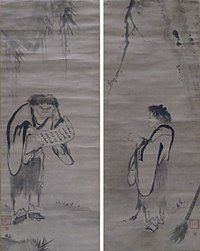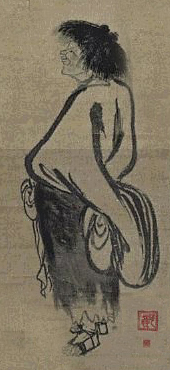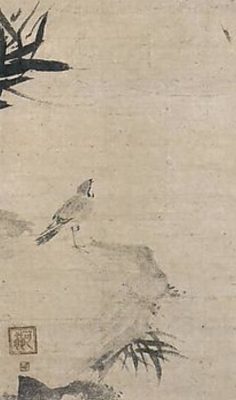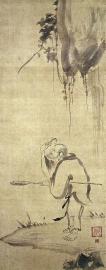Japanese art during the Nanboku-chō period
Lee Jay Walker
Modern Tokyo Times

The holy Buddhist monk Kaō Ninga belongs to the world of the Nanboku-chō period of bygone days. However, while the ideas of the fourteenth century represent the highpoint of his artistic life during the Muromachi period, earlier ideas equally blessed this gifted monk.

This relates to Buddhism and the fusion of different ideas that impacted Northeast Asia (China, Japan, and Korea) and in turn created new Buddhist concepts and ideas. Equally important, the Kamakura period in Japan (1185-1333) also impacted greatly on Kaō.

Thus, when viewing the art of Kaō, you can immediately feel the influence and fusions of Buddhism, the Middle Kingdom (China), and aspects of Japanese high culture related to the Kamakura and early Muromachi periods.

In another art piece, I comment, “Kaō lived during a period where the Kamakura period, Muromachi period, and the Middle Kingdom all impacted on his life. Equally, the holy words of the Buddha and the world of Zen ticked to an artistic beat.”

Of course, like the mirror of life – and how history is often remembered when glossing over the violent excesses of reality – his world was blessed by peace. However, many ordinary citizens faced war, poverty, and the reality of power concentration during the Nanboku-chō period.

PLEASE DONATE TO HELP MODERN TOKYO TIMES
Modern Tokyo News is part of the Modern Tokyo Times group
DONATIONS to SUPPORT MODERN TOKYO TIMES – please pay PayPal and DONATE to sawakoart@gmail.com
http://moderntokyotimes.com Modern Tokyo Times – International News and Japan News
http://sawakoart.com – Sawako Utsumi personal website and Modern Tokyo Times artist
https://moderntokyonews.com Modern Tokyo News – Tokyo News and International News
PLEASE JOIN ON TWITTER
https://twitter.com/MTT_News Modern Tokyo Times
PLEASE JOIN ON FACEBOOK